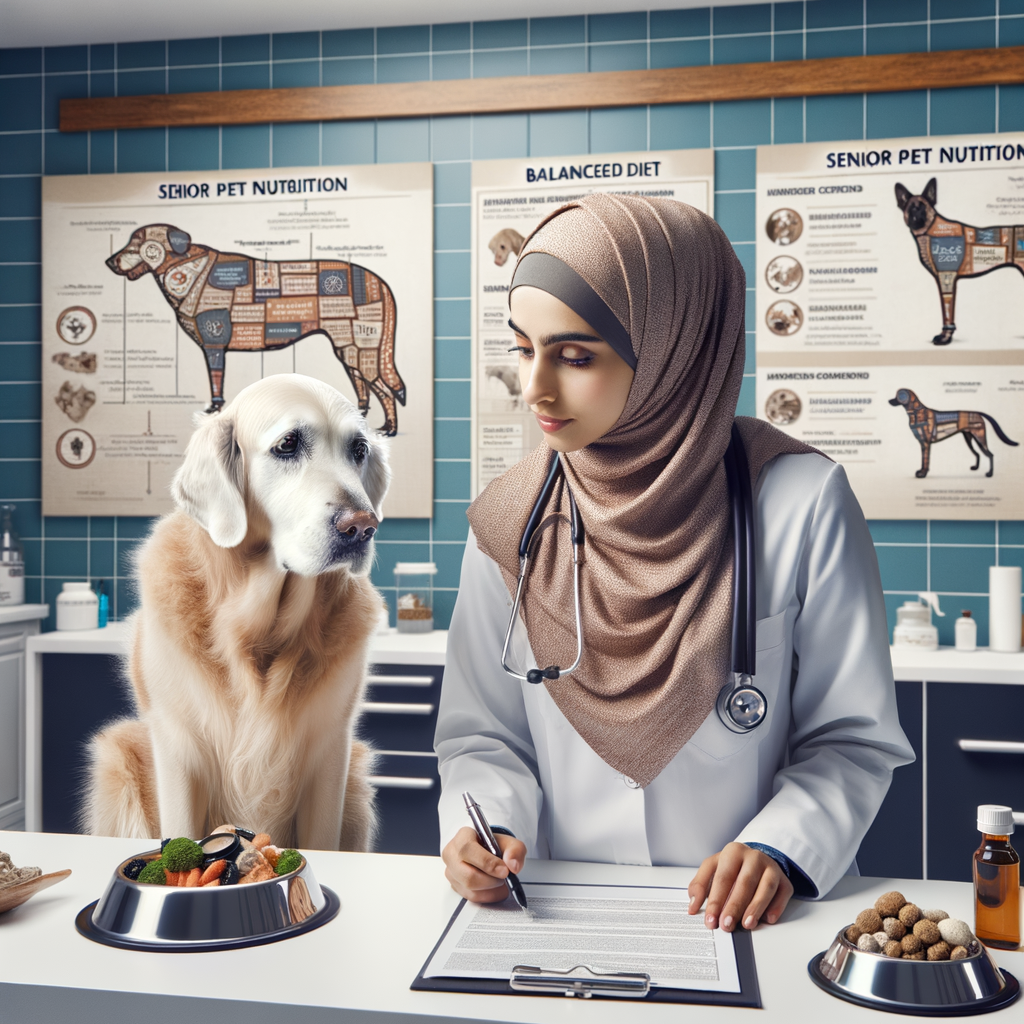
Introduction to Senior Pet Health
As our beloved pets grow older, their health needs change and evolve. It’s crucial to understand this process to provide them with the best care possible. In this section, we will explore the pet aging process, common misconceptions about old age in pets, and the importance of senior pet wellness.
-
Understanding the Pet Aging Process
Just like humans, pets go through various stages of life, each with its unique health needs. The aging process in pets is not merely about getting older; it involves changes in their physical health, behavior, and susceptibility to certain diseases. For instance, senior pets may experience decreased mobility, changes in appetite, and are often more prone to conditions like arthritis and kidney disease. Understanding these changes can help us better cater to our pets’ needs as they age.
-
Common Misconceptions About Old Age in Pets
There are many misconceptions about old age in pets. One common myth is that pets age seven years for every human year. However, this is an oversimplification. The aging process in pets varies depending on their size and breed. For example, large dog breeds tend to age faster than smaller ones. Another misconception is that old age is a disease. In reality, while aging can make pets more susceptible to certain health issues, it is a natural process, not a disease in itself.
-
The Importance of Senior Pet Wellness
Senior pet wellness is about more than just treating diseases; it’s about promoting a high quality of life for our aging pets. Regular vet check-ups are crucial to detect any potential health issues early. A balanced diet, regular exercise, and mental stimulation are also essential for keeping our senior pets healthy and happy. Remember, our pets rely on us to understand and cater to their changing needs as they age.
In the following sections, we will delve deeper into the essential aspects of aging pet care, common senior pet health issues, mental health needs of geriatric pets, end-of-life care for aging pets, and the importance of comprehensive senior pet care. Stay tuned to learn more about how to provide the best care for your aging pet.
Essential Aspects of Aging Pet Care
As our beloved pets age, their needs change and evolve. One of the most crucial aspects of caring for an aging pet is understanding their nutritional needs.
Senior Pet Nutrition
Proper nutrition plays a vital role in maintaining the health and vitality of our senior pets. Let’s explore some key aspects of senior pet nutrition.
- The role of diet in senior pet health
- Choosing the right food for your aging pet
- Supplements for elderly animal care
As pets age, their dietary needs change. They may require fewer calories, but more high-quality proteins and a variety of specific nutrients. A balanced diet can help manage weight, maintain muscle mass, and support overall health. For instance, a diet rich in omega-3 fatty acids can help support joint health and reduce inflammation.
Choosing the right food for your senior pet can be a challenge. It’s important to consider their breed, size, and health status. For example, smaller breeds may require a diet with smaller kibble size, while larger breeds may benefit from a diet formulated to support joint health. Always consult with your vet before making any significant changes to your pet’s diet.
Supplements can be a valuable addition to your senior pet’s diet. Glucosamine and chondroitin can support joint health, while probiotics can aid digestion. Antioxidants such as vitamins C and E can help support the immune system. However, it’s essential to consult with your vet before starting any supplement regimen.
In conclusion, proper nutrition is a cornerstone of senior pet care. By understanding the role of diet, choosing the right food, and considering the use of supplements, we can help our aging pets live a happy and healthy life.
Exercise and Physical Activity
Physical activity plays a crucial role in maintaining the overall health of your aging pet. It not only helps in keeping their bodies fit but also stimulates their minds, keeping them sharp and alert. However, as your pet ages, their exercise needs and capabilities change. Here, we will discuss how to adapt exercise routines for senior pets and the impact of physical activity on the pet aging process.
- Adapting Exercise Routines for Senior Pets
- The Impact of Physical Activity on Pet Aging Process
As your pet grows older, their energy levels may decrease and they may develop health issues that limit their mobility. However, this does not mean they should stop exercising. Instead, their exercise routine should be adapted to suit their current physical condition.
For instance, instead of long walks, you might consider shorter, more frequent walks. If your pet enjoys playing fetch, you might switch to a softer, smaller ball that is easier for them to handle. Swimming is another great low-impact exercise that can be beneficial for senior pets, especially those with joint issues.
Remember, it’s important to consult with your vet before making any significant changes to your pet’s exercise routine. They can provide guidance based on your pet’s specific health needs.
Regular physical activity can have a significant positive impact on your pet’s aging process. It helps maintain a healthy weight, which can reduce the risk of many age-related health issues such as diabetes and heart disease.
Exercise also promotes good joint health, which can help prevent or slow the progression of arthritis, a common issue in older pets. Moreover, physical activity stimulates the brain, which can help delay cognitive decline.
However, over-exercising can be harmful to your senior pet. It’s important to find a balance that provides the benefits of exercise without causing undue stress or injury. Again, your vet can help determine the right amount and type of exercise for your pet.
In conclusion, exercise remains an essential aspect of pet care, even as your pet ages. By adapting their exercise routine and understanding the impact of physical activity on their aging process, you can help ensure your pet remains healthy and happy throughout their golden years.
Common Senior Pet Health Issues
As our beloved pets age, they may face a variety of health issues. One common condition that affects many senior pets is arthritis. Let’s delve into understanding this ailment better.
Arthritis in Aging Pets
Arthritis is a condition that affects the joints and can cause a lot of discomfort and pain in pets. It’s more common in older pets, but it can affect animals of any age. The key to managing this condition is early detection and appropriate care.
- Recognizing the Signs of Arthritis
- Difficulty moving or stiffness, especially after resting
- Limping or favoring one leg
- Reluctance to jump, run, or climb stairs
- Changes in behavior, such as being more irritable or less active
- Treatment and Care for Aging Pets with Arthritis
- Medication: Your vet may prescribe anti-inflammatory drugs or pain relievers to help manage the pain.
- Weight Management: Keeping your pet at a healthy weight can reduce the strain on their joints.
- Exercise: Regular, gentle exercise can help keep joints flexible and strengthen the muscles that support them.
- Diet: Certain foods and supplements can help support joint health.
Arthritis can be tricky to spot, as our furry friends can’t tell us when they’re in pain. However, there are some signs you can look out for. These include:
If you notice any of these signs, it’s important to take your pet to the vet for a check-up.
While arthritis can’t be cured, there are many ways to manage the condition and improve your pet’s quality of life. Here are some strategies:
Remember, every pet is unique, and what works for one may not work for another. Always consult with your vet before making any changes to your pet’s care regimen.
Arthritis can be a challenging condition for both pets and their owners, but with the right care and treatment, your furry friend can still lead a happy and comfortable life.
Heart Disease in Elderly Pets
As our beloved pets grow older, they become more susceptible to various health issues, one of which is heart disease. This condition can significantly impact the quality of life of our furry friends, making it crucial to understand and manage.
- Understanding the risk of heart disease in senior pets
Heart disease in senior pets, especially dogs and cats, is a common health issue. According to the American Veterinary Medical Association, nearly 10% of dogs are diagnosed with heart disease during their lifetime. The risk increases with age, with senior pets being more prone to developing this condition.
Heart disease in pets can be congenital (they are born with it) or acquired (they develop it over time). In senior pets, acquired heart disease is more common. It can result from wear and tear on the heart, obesity, or other health issues like kidney disease. Symptoms may include coughing, difficulty breathing, decreased appetite, and lethargy.
- Preventive measures and treatments
While heart disease can be a serious concern, there are steps pet owners can take to prevent it or manage its effects. Regular veterinary check-ups are essential, especially for senior pets. These visits can help detect heart disease early, making treatment more effective.
Maintaining a healthy weight is also crucial. Obesity can put extra strain on your pet’s heart, leading to heart disease. Regular exercise and a balanced diet can help keep your pet’s weight in check.
When it comes to treatment, it depends on the type and severity of heart disease. Medications can help manage symptoms and slow the progression of the disease. In some cases, surgery may be necessary. It’s important to discuss treatment options with your vet to determine the best course of action for your pet.
In conclusion, understanding the risks and implementing preventive measures can significantly reduce the impact of heart disease on your senior pet’s life. By staying vigilant and proactive, we can ensure our pets enjoy their golden years in the best health possible.
Geriatric Pet Needs: Mental Health
As our beloved pets age, their needs change, and this includes their mental health. Just like humans, pets can experience mental decline as they get older. It’s essential to recognize the signs of mental decline and take steps to stimulate their mental health. Let’s delve into these topics below.
- Recognizing signs of mental decline
Senior pets can show various signs of mental decline, also known as cognitive dysfunction syndrome (CDS). These signs may include confusion, disorientation, reduced interaction, altered sleep patterns, and house soiling. It’s crucial to monitor your pet’s behavior and consult with a veterinarian if you notice any changes.
For instance, if your usually playful dog starts to lose interest in his favorite toys or your cat who’s always been meticulous about her litter box starts having accidents around the house, these could be signs of mental decline. Remember, early detection can lead to better management of the condition.
- Activities to stimulate mental health in senior pets
Keeping your senior pet mentally stimulated is a key component of their overall health and well-being. Here are some activities that can help:
- Interactive Toys: Toys that challenge your pet to think and solve problems can help keep their minds sharp. Puzzle toys that dispense treats when solved are a great option.
- New Tricks: Contrary to the old saying, you can teach an old dog new tricks! Training isn’t just for puppies. Teaching your senior pet new commands or tricks can stimulate their brain and strengthen your bond.
- Social Interaction: Regular interaction with other pets and people can provide mental stimulation. Remember to keep these interactions gentle and stress-free.
In conclusion, mental health is a vital aspect of geriatric pet care. By recognizing signs of mental decline and engaging your pet in stimulating activities, you can help ensure their golden years are happy and healthy.
End of Life Care for Aging Pets
As our beloved pets age, they require special care and attention. One of the most challenging aspects of this journey is knowing when to say goodbye. This section will guide you through this difficult process, focusing on euthanasia and the steps that follow.
Euthanasia and Saying Goodbye
Euthanasia is a humane way of ending a pet’s suffering when their quality of life has significantly deteriorated. It’s a difficult decision to make, but it’s sometimes the kindest one. Let’s explore this process further.
- Deciding when it’s time
- What to expect during the euthanasia process
- Grieving and remembering your pet
Knowing when it’s time to say goodbye to your pet is never easy. It’s important to consult with your veterinarian, who can provide guidance based on your pet’s health condition. Signs that your pet may be suffering include chronic pain, loss of appetite, difficulty moving, and a general decrease in their quality of life.
Euthanasia is a peaceful process. Your vet will administer a sedative to help your pet relax, followed by a drug that gently and painlessly ends their life. You can choose to be present during this process, providing comfort to your pet in their final moments.
After saying goodbye, it’s natural to feel a deep sense of loss. Allow yourself time to grieve. Remembering your pet can be a beautiful part of the healing process. Consider creating a memory box with their favorite toys or photos, or planting a tree in their honor.
End of life care for aging pets is a difficult journey, but understanding the process can help make it a little easier. Remember, it’s okay to seek support and take time to heal.
Conclusion: The Importance of Comprehensive Senior Pet Care
As we reach the end of our discussion on senior pet health, it’s crucial to revisit the importance of comprehensive care for our aging pets. They are not just animals; they are our family members who have been with us through thick and thin. As they age, their needs change, and it becomes our responsibility to ensure they live out their golden years in comfort and happiness.
- Revisiting the importance of senior pet health
Senior pet health is a topic that cannot be overstated. As our pets age, they become more susceptible to a variety of health issues, from arthritis to diabetes, heart disease, and even mental health issues. Regular vet visits, a balanced diet, regular exercise, and mental stimulation are all crucial aspects of senior pet care. Remember, prevention is always better than cure. Regular check-ups can help detect potential health issues early, allowing for early intervention and better management.
- Final thoughts on caring for your aging pet
Caring for an aging pet can be challenging, but it’s also a rewarding experience. It’s a chance to give back to our loyal companions who have given us so much love and joy over the years. As pet owners, it’s our duty to ensure that our pets’ golden years are filled with comfort, love, and happiness. Let’s remember to be patient, understanding, and accommodating of their changing needs.
In conclusion, comprehensive senior pet care is not just about addressing physical health issues. It’s about taking a holistic approach that includes mental health, nutrition, exercise, regular vet check-ups, and end-of-life care. By doing so, we can ensure that our beloved pets live out their golden years in comfort and dignity.






